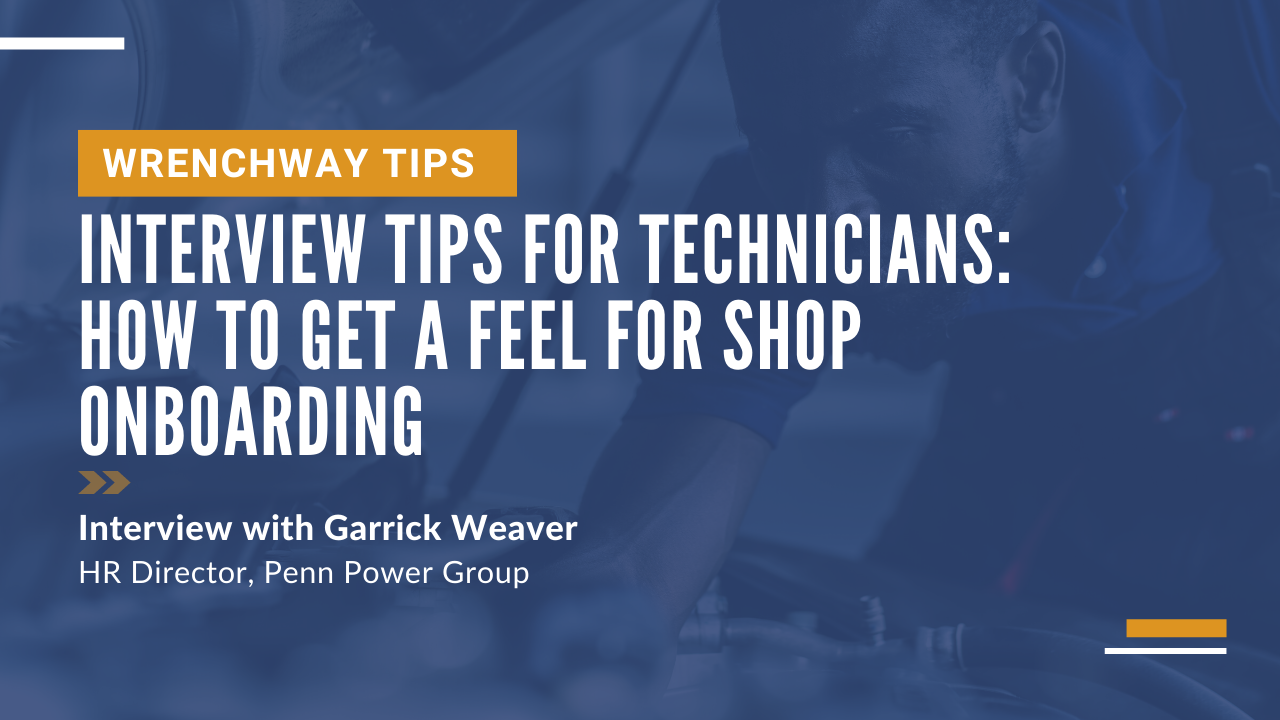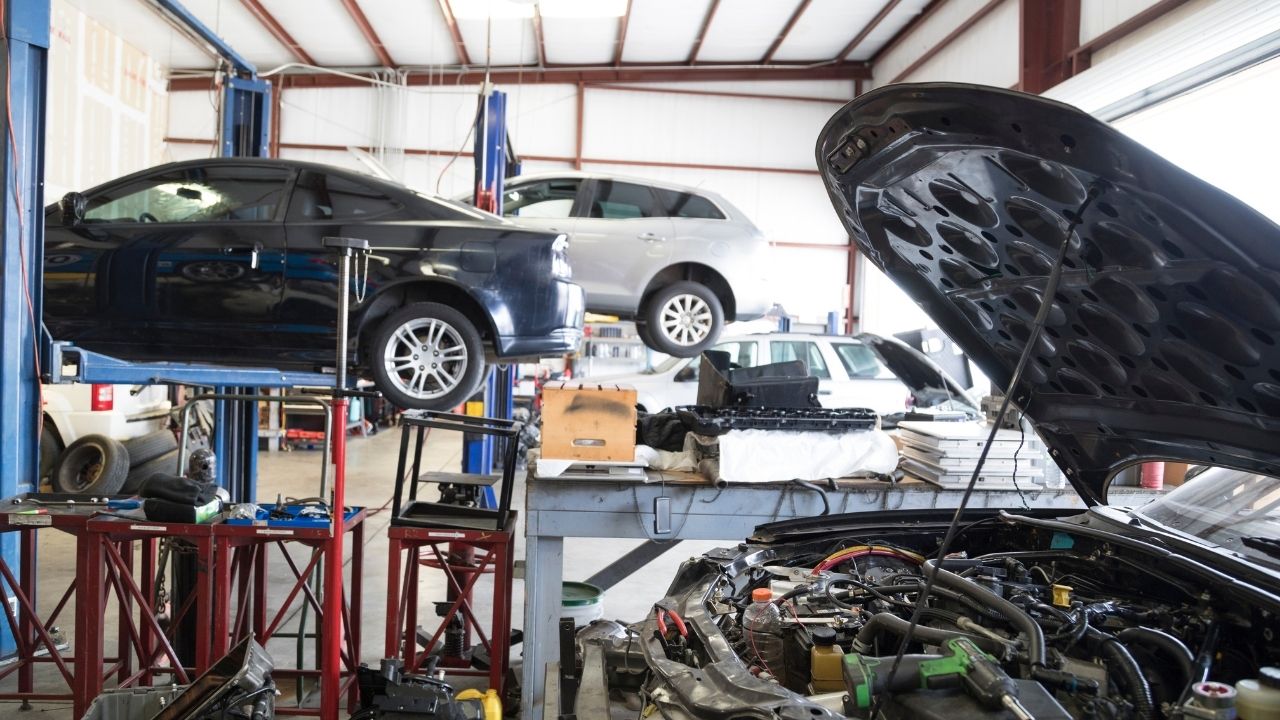This article is a part of a short ongoing series outlining interviewing tips for technicians. We sat down with Garrick Weaver, HR Director from Penn Power Group to get his professional insights on how technicians can make sure they’re asking the right questions in the interview to find the shop that’s the best fit for them.
There is a lot to cover in an interview. Not only does a shop owner or manager need to determine if a technician is a good fit for the shop, but a technician needs to make sure the shop is a good fit for them.
A shop’s onboarding process can make or break a technician’s experience in a new shop. A good onboarding process should acclimate the technician to their new role, the shop’s culture, and set them up for long-term success in the shop.
Because onboarding plays such a key role in determining how well a technician will perform in a new shop, it’s important for the technicians to ask the right questions during the interview process to make sure they’re going to have all the resources they need to be successful.
What are the Questions Technicians Should Ask About Onboarding in an Interview?
The key to understanding a shop’s onboarding process begins with asking questions during the interview process so technicians know what is expected of them as a new employee.
Technicians should ask their interviewer:
- What will my first week look like?
- When should I bring in my toolbox?
- What will be expected of me the first week on the job?
- Is there anything I can do before my first week to help me prepare for the job?
In addition to the questions above, technicians should be aware of any specific resources or training they think they might need in order to be successful in their new role, and ask the interviewer if those resources or training will be made available to them.
Pro Tip: Don’t just ask the person in charge of hiring these questions. Ask to speak to one or a few of the technicians in the shop. It’s normal to tailor onboarding for technicians based on their level of experience and skillset, so don’t be alarmed if every answer is a little different. The important thing to look for is that each technician received the onboarding they needed to be successful in their role.
How Technicians Can Prepare for the First Week on the Job
Assuming the interview went well and an offer was extended, the next thing technicians can do to ensure onboarding goes well is to make sure they have everything ready for their first day.
Here is a list of things technicians can complete before their first day:
- Sign the offer letter.
- Fill out any paperwork that can be done before the first day.
- Complete a drug test, if necessary.
- Rent a Uhaul or arrange for transportation of their tool box.
Since each shop is a little different, make sure to ask the hiring manager if there’s anything else that can be taken care of before the first day. As anyone who has started a new job knows, the first week is overwhelming. Anything that can be taken care of ahead of time is going to reduce stress and increase focus on the important things during their first week.
Pro Tip: Technicians should make sure they start off on the right foot on day one by showing up prepared. To prepare for the first day, technicians should make sure to ask the hiring manager what time to be there, where to park, what to wear, and who to ask for.
What Technicians Can Do to Make the Most Out of Shop Onboarding
The first week on any job is like drinking from the fire hose. It’s overwhelming for everybody, and that’s ok. It shouldn’t be a red flag for technicians if the first week feels a little chaotic.
Shop owners and managers have a business to run, so it’s important for technicians to remain flexible during onboarding, especially during that first week where there is a lot that needs to be covered.
Here are a few things technicians can do to make their first week goes smoothly:
- On the first day, bring lunch and bring money. Depending on business that day, managers may not have time to take a new technician to lunch. Techs can be prepared by bringing their own lunch, and having money in case people pool cash to order in.
- Technicians should keep a notebook in their toolbox, and take notes throughout the first week. The first week can be information overload, so it’s good to have something to look back on as they get into the job.
- Ask who a good point person is to go to with questions that arise as they’re getting acclimated in the shop.
- After the first couple of days, technicians should tell the manager what they’ve learned, and ask what is expected of them for the following week.
Pro Tip: Technicians shouldn’t panic if the onboarding process isn’t completely organized. This is especially true for smaller shops or if the position is new. Plus, every technician is unique, so while some parts of the onboarding process can be standardized, some should be tailored to the employee.
See It In Action: How Penn Power Group Makes Sure Onboarding Goes Smoothly for New Technicians
Garrick Weaver, HR Director at Penn Power Group, understands how important onboarding is for new technicians. Below are some of the things Penn Power Group does to help their new technicians get acclimated:
- Before their first day: HR tries to complete as much paperwork ahead of time. They make sure they have a signed offer letter from the tech, a completed drug test, and they run a background check.
- 1-2 day before they start: HR checks in with the new technicians and lets them know what time to be there on their first day, who to ask for, and what to wear.
- First day on the job: The new technician gets paired up with somebody who will show them how to use the computer systems, how to enter work orders, etc.
- Tailored onboarding based on experience: The remainder of the onboarding is customized for each technician based on their level of experience and skill set. While senior technicians may just need help with the computer systems, more junior technicians will be assigned a buddy that will spend additional time with them and answer any questions they have.
The Key to Onboarding Success: Be Prepared & Be Flexible
Starting a new job can be stressful. However, by asking the right questions throughout the interview process, technicians can not only make sure they’re choosing a shop that’s the best fit for them, but they can also alleviate a lot of the stress by being well-prepared and knowing what to expect and what is expected of them during the first few weeks on the job.




